
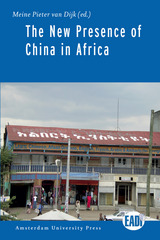
China’s economic and political presence in Africa has expanded drastically over the past decade, especially in the sub-Saharan region. Convinced that Western attempts at providing aid to Africa have failed, Chinese officials have sought new forms of aid and invested billions to push further development in Africa. But some in the United States and around the word fear that China’s interest in sub-Saharan Africa could threaten previous efforts to protect human rights and to promote democracy in the region. The New Presence of China in Africa takes on this controversial issue, offering an overview of the Chinese model and evaluating whether it might serve as an example for future Western endeavors.
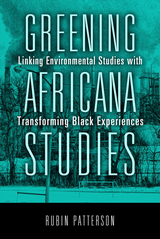
In his original work, Patterson demonstrates the ways in which black communities are harmed by local environmental degradation and global climate change. He shows that many local unwanted land use sites (LULUs), such as brownfields and toxic release inventory facilities, are disproportionately located in close proximity to neighborhoods of color, but also to colleges and universities with Africana studies programs. Arguing that such communities are not aggressively engaging in environmental issues, Greening Africana Studies also provides examples of how Africana studies students as well as members of black communities can prepare for green careers.

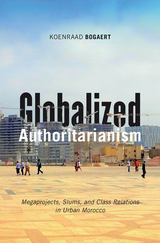
A rich investigation into Morocco’s urban politics
Over the past thirty years, Morocco’s cities have transformed dramatically. To take just one example, Casablanca’s medina is now obscured behind skyscrapers that are funded by global capital and encouraged by Morocco’s monarchy, which hopes to transform this city into a regional leader of finance and commerce. Such changes have occurred throughout Morocco. Megaprojects are redesigning the cityscapes of Rabat, Tangiers, and Casablanca, turning the nation’s urban centers into laboratories of capital accumulation, political dominance, and social control.
In Globalized Authoritarianism, Koenraad Bogaert links more abstract questions of government, globalization, and neoliberalism with concrete changes in the city. Bogaert goes deep beneath the surface of Morocco’s urban prosperity to reveal how neoliberal government and the increased connectivity engendered by global capitalism transformed Morocco’s leading urban spaces, opening up new sites for capital accumulation, creating enormous class divisions, and enabling new innovations in state authoritarianism. Analyzing these transformations, he argues that economic globalization does not necessarily lead to increased democratization but to authoritarianism with a different face, to a form of authoritarian government that becomes more and more a globalized affair.
Showing how Morocco’s experiences have helped produce new forms of globalization, Bogaert offers a bridge between in-depth issues of Middle Eastern studies and broader questions of power, class, and capital as they continue to evolve in the twenty-first century.

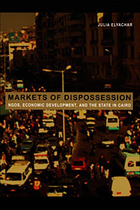
Julia Elyachar studied the efforts of bankers, social scientists, ngo members, development workers, and state officials to turn the craftsmen and unemployed youth of Cairo into the vanguard of a new market society based on microenterprise. She considers these efforts in relation to the alternative notions of economic success held by craftsmen in Cairo, in which short-term financial profit is not always highly valued. Through her careful ethnography of workshop life, Elyachar explains how the traditional market practices of craftsmen are among the most vibrant modes of market life in Egypt. Long condemned as backward, these existing market practices have been seized on by social scientists and development institutions as the raw materials for experiments in “free market” expansion. Elyachar argues that the new economic value accorded to the cultural resources and social networks of the poor has fueled a broader process leading to their economic, social, and cultural dispossession.

This history of administrative thought and practice in colonial Kenya looks at the ways in which white people tried to engineer social change.
It asks four questions:
- Why was Kenya’s welfare operation so idiosyncratic and spartan compared with that of other British colonies?
- Why did a transformation from social welfare to community development produce further neglect of the very poor?
- Why was there no equivalent to the French tradition of community medicine?
- If there was a transformatory element of colonial rule that sought to address poverty, where and why did it fall down?
The answers offer revealing insight into the dynamics of rule in the late colonial period in Kenya.

Essays by the top scholars in the Weld span the breadth of the issue, from Uganda's growth out of poverty to development at the grass roots level. Developing Uganda replaces the myth and misinformation the last decade has witnessed with a realistic scrutiny by those who have studied it with care and caution.
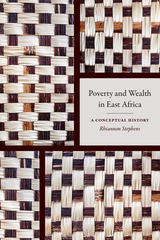
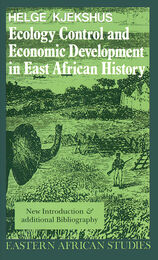
The book puts people at the centre of events. It thus serves as a modification to nationalist history with its emphasis on leaders. It presents environmental factors that had been underestimated; for instance, it points to the critical importance of the rinderpest outbreak.
Helge Kjekshus provides evidence to suggest that the nineteenth century was a period of relative prosperity with well-developed trade. He questions the view that warfare was pervasive and that the slave trade led to depopulation. He points to a balance between man and the environment.
This book is reissued at the same time as the first publication of Custodians of the Land: Ecology and Culture in the History of Tanzania edited by Gregory Maddox, James I. Giblin and Isaria N. Kimambo. The footnotes in that book point to the importance of the work of Helge Kjekshus.
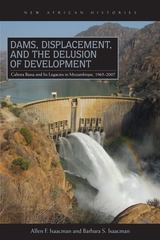

In the late fifties and early sixties, Govan Mbeki was a central figure in the African National Congress and director of the ANC campaigns from underground. Born of a chief and the daughter of a Methodist minister in the Transkei of South Africa in 1910, he worked as a teacher, journalist, and tireless labor organizer in a lifetime of protest against the government policy of apartheid. Over two decades of imprisonment on Robben Island did not consign him to obscurity. Along with Nelson Mandela and Walter Sisulu, his name has become a symbol of resistance, not only to the oppressed people of South Africa, but also to the international community who have conferred on him many honors and awards.
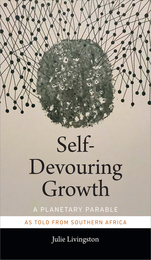
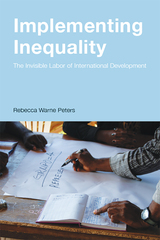
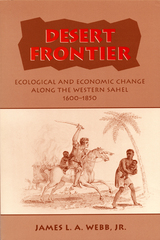
Desert Frontier is a study of the ecological and economic impact of a long-term trend toward increasing aridity along the southern edge of the western Sahara. Beginning in the early seventeenth century, this climatological trend forced the desert approximately 200–300 kilometers to the south, transforming ethnic identities and ways of life along the length of the Sahel. Based on extensive archival research and on Saharan oral data, Desert Frontier argues that the principal historical dynamics of the precolonial Sahel were determined by this pervasive ecological crisis, rather than by the dynamics of a European-dominated world system.
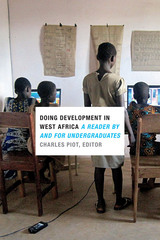
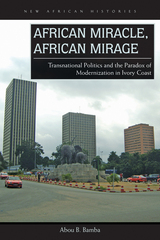
Throughout the 1960s and 1970s, Ivory Coast was touted as an African miracle, a poster child for modernization and the ways that Western aid and multinational corporations would develop the continent. At the same time, Marxist scholars—most notably Samir Amin—described the capitalist activity in Ivory Coast as empty, unsustainable, and incapable of bringing real change to the lives of ordinary people. To some extent, Amin’s criticisms were validated when, in the 1980s, the Ivorian economy collapsed.
In African Miracle, African Mirage, Abou B. Bamba incorporates economics, political science, and history to craft a bold, transnational study of the development practices and intersecting colonial cultures that continue to shape Ivory Coast today. He considers French, American, and Ivorian development discourses in examining the roles of hydroelectric projects and the sugar, coffee, and cocoa industries in the country’s boom and bust. In so doing, he brings the agency of Ivorians themselves to the fore in a way not often seen in histories of development. Ultimately, he concludes that the “maldevelopment” evident by the mid-1970s had less to do with the Ivory Coast’s “insufficiently modern” citizens than with the conflicting missions of French and American interests within the context of an ever-globalizing world.
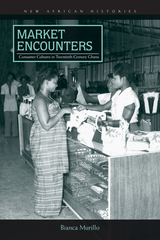
In Market Encounters, Bianca Murillo explores the shifting social terrains that made the buying and selling of goods in modern Ghana possible. Fusing economic and business history with social and cultural history, she traces the evolution of consumerism in the colonial Gold Coast and independent Ghana from the late nineteenth century through to the political turmoil of the 1970s.
Murillo brings sales clerks, market women, and everyday consumers in Ghana to the center of a story that is all too often told in sweeping metanarratives about what happens when African businesses are incorporated into global markets. By emphasizing the centrality of human relationships to Ghana’s economic past, Murillo introduces a radical rethinking of consumption studies from an Africa-centered perspective. The result is a keen look at colonial capitalism in all of its intricacies, legacies, and contradictions, including its entanglement with gender and race.

In the 1980s, world recession, drought, civil conflict, and other forces brought major economic upheaval to the countries of Sub-Saharan Africa. Most of the early efforts by governments to stabilize their economies met with little success, but The Gambia was an exception. In 1985 the government introduced the Economic Recovery Program, one of the most sweeping reform programs attempted on the continent. The economy quickly stabilized, with the rate of inflation falling to below ten percent and the overall balance of payments in surplus for the first time since the early 1970s.
Economic Recovery in The Gambia examines The Gambia's success in depth. It analyzes a wide range of policy reforms-exchange rates, taxation, foreign debt, agriculture, state-owned enterprises, customs inspection-and in each case, the authors review problems the government faced, steps that were taken to address them, and the success and failures of the reform initiatives. These economic and institutional analyses are complemented by an examination of the politics of reform and the role that donor agencies played. The final chapter summarizes important lessons from The Gambia's experience, and provides insights for other countries in Sub-Saharan Africa.

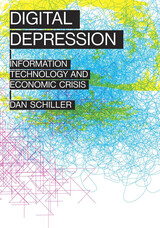
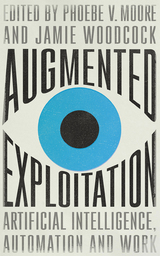
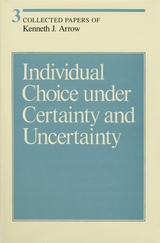
Unlike the papers of some other great economists, those of Kenneth Arrow are being read and studied today with even greater care and attention than when they first appeared in the journals. The publication of his collected papers will therefore be welcomed by economists and other social scientists and in particular by graduate students, who can draw from them the deep knowledge and the discernment in selection of scientific problems that only a master can offer. The author has added headnotes to certain well-known papers, describing how he came to write them.
The third volume of Kenneth Arrow's Collected Papers concerns the basic concept of rationality as it applies to an economic decision maker. In particular, it addresses the problem of choice faced by consumers in a multicommodity world and presents specific models of choice useful in economic analysis. It also discusses choice models under uncertainty, giving the basic theory and critiques of this theory based on experimental evidence and applications. Among the major papers are "Alternative Approaches to the Theory of Choice in Risk-Taking Situations," a masterly survey of subjective probability and choice theory, and "The Theory of Risk Aversion," an exposition of the theory of choice under uncertainty.

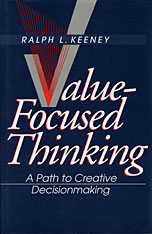
The standard way of thinking about decisions is backwards, says Ralph Keeney: people focus first on identifying alternatives rather than on articulating values. A problem arises and people react, placing the emphasis on mechanics and fixed choices instead of on the objectives that give decisionmaking its meaning. In this book, Keeney shows how recognizing and articulating fundamental values can lead to the identification of decision opportunities and the creation of better alternatives. The intent is to be proactive and to select more attractive decisions to ponder before attempting any solutions.
Keeney describes specific procedures for articulating values by identifying and structuring objectives qualitatively, and he shows how to apply these procedures in various cases. He then explains how to quantify objectives using simple models of values. Such value analysis, Keeney demonstrates, can yield a full range of alternatives, thus converting decision problems into opportunities. This approach can be used to uncover hidden objectives, to direct the collection of information, to improve communication, to facilitate collective decisionmaking, and to guide strategic thinking. To illustrate these uses, Keeney shows how value-focused thinking works in many business contexts, such as designing an integrated circuit tester and managing a multibillion-dollar utility company; in government contexts, such as planning future NASA space missions and deciding how to transport nuclear waste to storage sites; and in personal contexts, such as choosing career moves and making wise health and safety decisions.
An incisive, applicable contribution to the art and science of decisionmaking, Value-Focused Thinking will be extremely useful to anyone from consultants and managers to systems analysts and students.
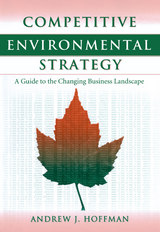
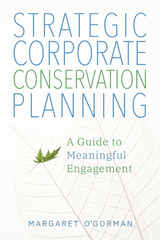
Recognizing the long history of mistrust between corporate action and environmental effort, Strategic Corporate Conservation Planning begins by explaining how to identify priorities that will yield a beneficial relationship between a company and nonprofit. Next, O’Gorman offers steps for creating ecologically-focused projects that address key business needs. Chapters highlight existing projects with different scales of engagement, emphasizing that headline-generating, multimillion dollar commitments are not necessarily the most effective approach. Myriad case studies featuring programs from habitat restoration to environmental educational initiatives at companies like Bridgestone USA, General Motors, and CRH Americas are included to help spark new ideas.
With limited government funding available for conservation and increasing competition for grant support, corporate efforts can fill a growing need for environmental stewardship while also providing business benefits. Strategic Corporate Conservation Planning presents a comprehensive approach for effective engagement between the public and private sector, encouraging pragmatic partnerships that benefit us all.
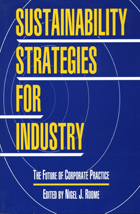
Sustainability Strategies for Industry contains essays by members of the Greening of Industry Network that examine the emerging picture of sustainability and its implications for industry and for the relationship between industry and other social actors -- consumers, employees, and the community at large. The book seeks to define sustainability in an industrial context, and addresses how the shift to sustainaibility will affect the role of industry in society, its managerial functions, and its relationships with stakeholders and the environment.
An introductory chapter establishes the scope of the book and its contents, sets out the historical context, and explores the unifying concepts and themes running through the text. Chapters examine.
the meaning of sustainability for industry from a theoretical stance corporate environmentalism company paradigms technology reporting and management systems the role of networks and systems developing country perspectives implications for business research and management educatio.
Contributors -- including Thomas Gladwin, Richard Welford, Andrew Hoffman, John Ehrenfeld, and David Pearce -- offer a bold vision of the sustainable industrial organization of the future and the role and approach that managers in sustainable organizations will assume.
Sustainability Strategies for Industry represents an important work for those interested in the relationship between sustainability and environmental management and protection, and for those interested in the future direction of industrial organization. It will be a valuable text for advanced undergraduate and graduate students in business and economics, as well as in environmental studies programs, and for researchers interested in business strategy and interactions between business practice and the environment.

Play to Submission shows how Behemoth’s games undermined and manipulated workers. They lost their work-life balance and the constant competition made labor organizing difficult. Nonetheless, many workers embraced management’s games as a chance to show off their “gamer” identities and create a workplace culture with privileged insiders and exiled outsiders, with female and migrant workers usually in the latter group. Moreover, Wu indicates this may be the future of work for high- and low-skilled and, creative workers in an environment where capitalists have heightened demands for technology and creativity.
Drawing from 13 months of ethnographic work, Wu presents a persistent reality in which the company reaps the reward of surplus productivity, leaving employees themselves in a highly competitive and sometimes precarious work position.

Successful corporate strategies, says this leading professor of management, depend upon dynamic marshaling of a firm's “invisible assets”—information-based resources such as technological know-how, the visibility of a brand name, or knowledge of a customer base—as well as tangible assets such as people, goods, and money. Hiroyuki Itami emphasizes the ways strategy must fit the firm's external environment (customers, competitors, and ever-changing technology) and also the importance of internal fit within the organization. He uses invisible assets as a single organizing concept to discuss the appropriateness of strategy in each area.
Strategy, Itami insists, must be adapted to rapidly changing conditions and must sometimes be prepared in advance of expected change. The most powerful strategy may often intentionally create imbalance in the short run in order to accumulate invisible assets and energize the organization. Itami examines successful strategies of Japanese firms, which have always operated in an environment of uncertainty and all-pervasive change. Sony and Honda are not the only examples, however—Itami also discusses IBM, Volkswagen, and the Swiss watch industry. The range of examples gives the book wide applicability and appeal to American business executives, who are now facing a similar situation of rapid change.
The clarity and sound construction of Itami's argument will make it useful not only to MBAs and theorists of international business and comparative management, but also to “real world” planners and managers who are currently coping with just the sort of situations Itami describes.

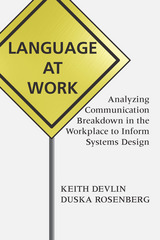

On the occasion of the fiftieth anniversary of Davis’s arrival at the Booth School, Why Are You Here and Not Somewhere Else offers seven essays by Davis that offer new perspectives and contribute to a more well-rounded understanding of business education. Adapted from convocation addresses given by Davis at different points during his five-decade career, the essays encapsulate the spirit of business education at the Booth School, while at the same time providing encouraging, invaluable wisdom for those about to embark on business careers or take on leadership positions. Topics addressed range from the role of the university in the business world to the crucial role of intangible values in shaping one’s career.
Davis has been a formative influence on more executives and leaders than perhaps any other business educator living today, and Why Are You Here and Not Somewhere Else provides a unique and valuable perspective on how leaders in business and elsewhere can shape and define their careers in new ways.

Intended primarily for those doing research in the field of international management, this book should also interest scholars and students of public institutions, sociology, and industrial psychology. Managers will find the book's comprehensive overview of international management to be invaluable. Its global perspective will appeal to readers around the world.
Betty Jane Punnett is Professor of International Business, University of the West Indies, Cave Hill Campus.
Oded Shenkar is Ford Motor Company Chair in Global Business Management, Fisher College of Business, the Ohio State University.


The concept of the “visible hand” in big business enterprise, so persuasively and brilliantly argued in Alfred D. Chandler, Jr.’s prize-winning The Visible Hand: The Managerial Revolution in American Business, is tested and extended in this book. These essays show that the growth and complexity of managerial hierarchies (“visible hands”) in large business firms are central to the organization of modern industrial activity. Leading American and European historians retrace and compare the historical evolution of the contemporary giant managerial hierarchies in the United States, Britain, Germany, and France.
The first group of essays—by Chandler, Leslie Hannah, Jürgen Kocka, and Maurice Lévy-Leboyer—explores the rise of modern industrial enterprise in the West. They suggest the mechanisms and causes of the shift from the invisible hand of market coordination to the visible hand of managerial hierarchies, and attempt to pinpoint cultural and economic reasons for the persistence of transitional forms of organization in Europe. Other essays—by Morton Keller and Oliver E. Williamson—describe the legal and regulatory responses to the rise of big business and the implications of the history of the managerial revolution for students of economic development and industrial organization. The final essay, by Herman Daems, provides an overall analysis of the reasons managerial hierarchies replaced market mechanisms and agreements among firms as devices for coordination and the allocation of resources in advanced market economies.
This fresh study of the managerial revolution presents recent theoretical reflections in institutional economics and industrial organization in the light of new historical findings.
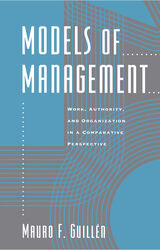
Guillén's study of two liberal-democratic societies (the United States and Great Britain) and two corporatist societies (Germany and Spain) reveals significant differences in the way managerial elites and firms have adopted the three models. His data show that ideas themselves—independent of material interests and technology—can cause organizational change. Throughout the book, contrasts between modernist-technocratic and liberal-humanist mentalities, as well as between Protestant and Catholic religious backgrounds, emerge as decisive factors in determining managerial ideology and practice.
In addition to analyzing management methods in organizations, Guillén explores larger issues: the interaction among managerial, government, and labor elites; the impact of the state and the professions on managerial behavior; and the role that managers play in modern societies.

The Sustainable Company shows how to create value for shareholders while balancing responsibilities to society and the environment. Its step-by-step approach and tool-kit for managers make this book the solutions manual for the twenty-first-century manager.

READERS
Browse our collection.
PUBLISHERS
See BiblioVault's publisher services.
STUDENT SERVICES
Files for college accessibility offices.
UChicago Accessibility Resources
home | accessibility | search | about | contact us
BiblioVault ® 2001 - 2024
The University of Chicago Press









